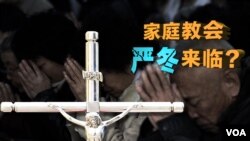Chinese officials have introduced new laws that would restrict religious writings and activities online, Agence France-Presse reports.
The restrictions reportedly affect images and descriptions of religious activities such as praying and burning incense.
News of the proposed laws comes as China increases efforts to control religious activities including those of Islam and Christianity.
The new rules would permit only members of officially recognized organizations to post some kinds of religious writings. The rules appeared in a draft document posted online Monday by government officials.
People would not be permitted to post photos, videos or words about religious activities. They also could not share religious links.
Organizations that do not follow the rules could be closed, the document said.
However, the document did not explain the possible punishment for violations. It said only that violations would be dealt with “according to the law.”
China’s government is officially atheist. Officials are worried about organized movements outside of government control.
Experts say efforts to control religious groups have grown under President Xi Jinping.
China officially recognizes five religions. But, the government places controls on what they can do. The government decides who can go to religious services and what can be said by religious leaders.
The proposed law reportedly says that the laws will help with “social stability” and stop extremist groups.
It also bans releasing religious information within China by any “overseas individuals and organizers.”
Jeremy Daum is an expert on Chinese law. He said the new rules could make it illegal to put information about any kind of religious activity on the internet. He added that it could include even pictures from a marriage ceremony.
Daum also said that “even parts of traditional Chinese culture” could be banned from appearing online.
The country’s top leaders recently called for religions to accept “traditional” Chinese values and culture. This has rights groups worried.
The Chinese government has stated it wants to stop “extremism.” In parts of the country with a large number of Muslims, it has removed Islamic symbols from public areas.
In western Xinjiang, Uighurs and other Turkic Muslim minorities are being punished for violating laws against some religious activities.
As many as one million Muslim minorities are believed to be held in re-education camps in Xinjiang, rights groups say.
Many of them were detained for posting “extremist” religious material on the internet.
I’m Susan Shand.
Agence France Presse reported this story. Susan Shand adapted it for Learning English. George Grow was the editor.
_______________________________________________________________
Words in This Story
incense – n. a substance that is used often in religious ceremonies to produce a strong and pleasant smell when it is burned
post – v. to put online
draft – adj. a beginning copy, not the final copy
atheist – n. one who does not believe in any God or faith
stability – n. the quality or state of something that is not easily changed or likely to change
symbol – n. a picture, a letter or a number that represents something








